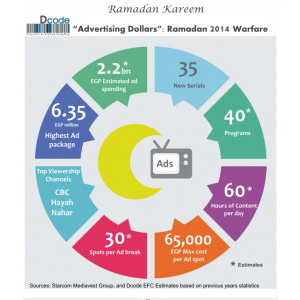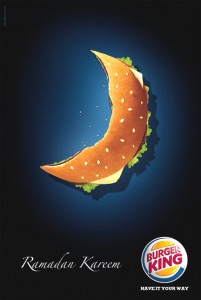Marketing in Ramadan: Gently Does It
This past weekend, Independence Day kicked off with its traditions of fireworks, barbecues and baseball games. But for Muslims in America and the world over, a different cultural event is drawing their attention. Ramadan is the most significant event in the year for most Muslims, stretching over an entire month of the Islamic calendar.
Although not equivalent to a Christian festival like Christmas, Ramadan does offer significant opportunities for marketers seeking to reach out to Muslim customers.
Amani Ismail and Sara El-Khalili, assistant professor and adjunct faculty member at the Department of Journalism and Mass Communication at the American University in Cairo, Egypt, offer insights into marketing during Ramadan across the Muslim world.

1. What significance does Ramadan have in the Muslim world?
First, Ramadan is a period of fasting – no food and no drink from dawn to dusk for the whole month. As the fourth of Islam’s five pillars, the act of fasting is a deeply spiritual act.
Second, Ramadan is about charity. The third pillar of Islam mandates that Muslims must give alms to the poor during the month of Ramadan.
The third significant feature of Ramadan is the increased amount of time spent with family and friends. During this period more than any other, relatives, families and friends regularly get together to celebrate iftar – the breaking of the fast – as well as Eid al-Fitr, the three-day festival that marks the end of the fasting period.
Successful marketing strategies in Ramadan must take into account these three important aspects.
2. Does Ramadan offer any opportunities to marketers that are not available during the rest of the year?
The short answer is yes. After breaking fast each evening, many families spend time together watching television. Primetime lasts longer than usual, as many people arrive home earlier and stay up later.
The focus has until recently been on television ads, but with the increasing penetration of internet access via smartphones, this is gradually shifting towards social media. Advertisers spend more money during Ramadan than at any other period of the year.
Marketing messages are closely focused on two things: food and charity.
Both the daily fast and the nightly feast encourage people to think more about food. Certain traditional dishes, including oriental desserts such as konafa, qatayef and basbousa, are closely associated with Ramadan and therefore have particular resonance. You will also see hotels offering special Eid al-Fitr brunches, and fast food chains such as Burger King or KFC putting on campaigns.

Many adverts and marketing communications play on the charity theme. Messages about goodwill, charity and benevolence are more likely to find favor among Muslims than aggressive marketing of cut-price offers.
3. How can companies generate goodwill around Ramadan?
The good news for marketers is that the simplest strategies are the best. Wish your Muslim customers a happy and blessed Ramadan at the start of the month, and the same for Eid-al-Fitr at the end.
Small but significant gestures – such as the Eid stamps issued by the US postal service in recent years, are much appreciated in Muslim communities.

With its emphasis on family and charity, Ramadan is a time for brands to enhance their reputation among customers rather than make direct sales. Using symbols that resonate particularly strongly during this period, such as the crescent moon and the iconic lantern, is one way to play on the spirit of the occasion.
4. And how can companies avoid offense?
Sensitive topics such as alcohol and sex become ultra-sensitive during Ramadan.
Being overtly commercial is also something to shy away from. Tacky gestures – like cell phone ring tones playing Ramadan songs – detract from the spiritual significance of this important religious festival.
Language is also important. Some companies think that since the Koran is in Arabic, they should wish everyone a blessed Ramadan in Arabic. In fact, the majority of the world’s Muslims are not Arab, so this strategy risks causing a feeling of exclusion. It is better to target your messages locally – for example, in Indonesian to Indonesia – or to wish your Muslim customers in general a blessed Ramadan in English.
By focusing on the spirit of the occasion, on family, charity and goodwill, brands can also avoid offending non-Muslim minorities.
When in doubt, ask at least two or three trusted local contacts to review a proposed marketing message before sending it out. Ramadan has powerful cultural significance. Do it right and you can tap into that to enhance your reputation among Muslim customers. Do it wrong and you could destroy your reputation.
Ramadan Kareem!
Learn more about the latest content marketing strategies.
Monica Guy – Director of Content Marketing EMEA



